The dramedy 50/50, directed by Jonathan Levine (The Wackness), is one of my favorite films of 2011. Starring Joseph Gordon-Levitt, Seth Rogen, Anna Kendrick, Bryce Dallas Howard, and Anjelica Huston, the film is based on screenwriter Will Reiser’s real-life battle with cancer and focuses on the twists, turns, shock, sadness, and comedic relief that he experienced along the way.  In addition, while all the performances are fantastic, Gordon-Levitt is operating on another level. I really believe he's one of the best actors working in Hollywood.Recently, I was able to speak with Levine to discuss the film. We talked about everything from how he got on the project to how he was able to make the film feel like real life and not some Hollywood twentysomething cancer story.  We also talked about deleted scenes, editing, extended cuts, Gordon-Levitt's performance, landing Michael Giacchino for the soundtrack, Pearl Jam, and a lot more. Hit the jump to read what he had to say and make sure to see 50/50 when it hits theaters at the end of September.Before reading the interview, you can watch the 50/50 trailer here. Also, for what Levine said about his future projects like Warm Bodies, Legend, Jamaica, and Little Girl Lost, click here.Collider: How did you first get attached to the project?Jonathan Levine: Well I read the script kind of right when The Wackness was coming out, and that process really actually was a fairly exhausting process for me, I’d thrown my heart and soul into it. I had been really, really close with Tom and Michael with getting the movie out and stuff, and at the time I just didn’t really know what I wanted to do, so I read the script and I said, “This is great, I don’t think I wanna do it. I don’t think I’m ready to even know what I wanna do right now.†So then, in the ensuing six months I actually had two family members get cancer. They both turned out, luckily, OK, but all the things in the script started really resonating with me, and I kept thinking about it, and I went back and looked at it, and it sort of just resonated on an entirely new personal level for me. I called my agent and I was like, “What’s up with I’m With Cancer?†which is what it was called at the time, I was like, “I really now wanna do it,†and someone else was doing it, so I was super distraught. Cut to eight months to a year later, and that director fell off of it and I just pursued it vehemently, sat down with [producer/star] Seth [Rogen] and [producer] Evan [Goldberg], got along really well with them, I gave them my take on it, and then we were in Vancouver like two months later. When you sat down with them how did they envision the project versus the way you envisioned it? Were you on the same page from the get-go?Levine: I think we really were on the same page. We really liked a lot of the same films, we talked a lot about some Hal Ashby movies, we talked about The Last Detail. For me, I really wanted to ground it in like the specificity of being a young person, and I felt like that was a perspective that I could bring to the table more than a lot of directors because I’m younger than a lot of some directors. For me, the most compelling thing to me was what’s it like to be 27 and find out you have a 50% chance of living, and you haven’t even lived yet? That was the angle I took to it, it was almost kind of a Cameron Crowe, Garden State kind of thing, which I don’t think was quite what they had envisioned, but once I sort of talked them through it I think they really got excited about it. And it’s not that different from the Hal Ashby/James Brooks thing that is so inherent to the script. But that was my take, was grounding it in the experience of being 27. If you look at the movie, I think we did a good job with that because I think it is very grounded and it is very specific to the perspective of someone in their late twenties. When you got on set and you’re filming, was this one of the projects where the script from the get-go stayed the same? How much did the script change through the process?Levine: Seth and Evan’s process, which was the process of the movie which I quickly learned and quickly learned to love, is very adaptive. It’s very much “the best idea wins,†we’re all gonna collaborate, and yes we had a great script, Will [Reiser] wrote an amazing script, but the production process is so fluid that you have to be open to new ideas that the universe throws at you, that happens maybe 30% of the time. That 30% kind of continued to evolve, but of course that 30% informs the other 70% of the movie, so the entire movie becomes this fluid thing, and it’s a great, great, great way to make a movie, I think it’s fantastic. It just makes the movie better, you’re constantly questioning it and you’re constantly using your resources to make it as awesome as possible, and you’re never settling for anything. One of the things I think the film does really, really well is balancing the drama with the funny stuff. It’s not so heavy-handed and it’s also not just a comedy, it feels like real life. Could you talk about finding that tone in the editing room, or was it there on set?Levine: It was in the script, A, and B it was kind of a creative mandate that we all had that we wanted the movie to be funny as possible, but we never wanted it to feel like we were just going for a joke that wouldn’t happen in real life. It’s exactly what you said, we wanted it to feel like real life. I find that movies are more like they have to be one thing or they have to be another thing, and to me, life is just like the most ridiculously funny thing followed by the most ridiculously sad thing followed by another intense thing, life doesn’t always match up to a genre. So that was something that, no matter what we tried on set, those were always our creative guidelines. Yes, sometimes we probably found ourselves going too far for a joke and we cut it out fo the movie. Yes, a lot of the tone was found in the editing room, a lot of the tone is kind of helped out by music, by the amazing score that Michael Giacchino wrote, by a lot of the great songs that Jim Black and Gabe Hilper and our music supervisors and our editor picked out, but it’s also a lot about what you cut out. I am very, very big on cutting stuff out, I think most movies are too long, I really like a tight kind of 90 minute movie. Once I saw our first cut that was like 2 hours and 40 minutes, I knew that we had a great 90 minute movie in there, and it’s very liberating to just cut the stuff that doesn’t work and you’re left with really funny stuff and really intense dramatic stuff, and as long as it stays true to the characters and the situations that they’re in, that’s not hard, it’s not hard creating a tone out of that, that’s just the tone of the script and the tone of the great actors that are in the script. 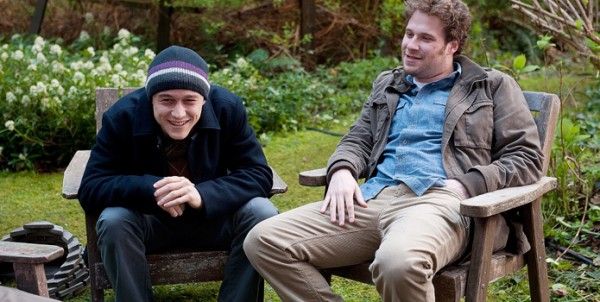 When you eventually release the DVD/Blu-ray are a lot of the things you cut out gonna end up as like deleted scenes?Levine: We already did it, we just did the commentary the other day, we have like five deleted scenes maybe. There were some deleted scenes that just like sucked so we didn’t put them on, but there were some deleted scenes that just kinda sucked and we did put them on (laughs). And then there are like three or four deleted scenes that are just awesome and just didn’t work either because there was something too funny before it and it was a hard jump to get into the sad thing. Either the context or the pacing, they didn’t work. So are you doing this as like a separate deleted scene section or will you allow like an extended cut?Levine: No, I don’t wanna do an extended cut, cause if I wanted it in the extended cut I would just put it in the movie. I don’t get that, I think that’s just a marketing thing isn’t it?
When you eventually release the DVD/Blu-ray are a lot of the things you cut out gonna end up as like deleted scenes?Levine: We already did it, we just did the commentary the other day, we have like five deleted scenes maybe. There were some deleted scenes that just like sucked so we didn’t put them on, but there were some deleted scenes that just kinda sucked and we did put them on (laughs). And then there are like three or four deleted scenes that are just awesome and just didn’t work either because there was something too funny before it and it was a hard jump to get into the sad thing. Either the context or the pacing, they didn’t work. So are you doing this as like a separate deleted scene section or will you allow like an extended cut?Levine: No, I don’t wanna do an extended cut, cause if I wanted it in the extended cut I would just put it in the movie. I don’t get that, I think that’s just a marketing thing isn’t it? 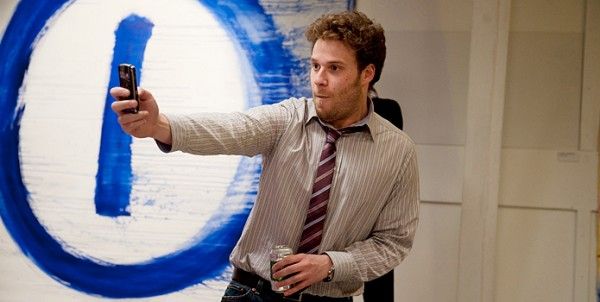 I think extended cuts work when it’s like Lord of the Rings or like Watchmen where the film couldn’t fit on the platter because it was an IMAX release, so you had to loose some things to literally make it fit in a theater. But other times I think it’s a studio just trying to make more money.Levine: Yeah yeah. No, I don’t think we’re gonna do an extended cut cause there’s a reason we cut it out in the first place, we never had pressure to make a running time or anything like that. So no, they’re just gonna be there as deleted scenes. How many extended cuts are better? They’ve always gotta be worse than the movie. Is the Watchmen extended cut better? The Watchmen extended cut is so much better, it’s night and day. There are three different versions, the full one with the animated stuff is not as good as just the director’s take. Are you familiar with Watchmen?Levine: Yeah, I just watched it actually.
I think extended cuts work when it’s like Lord of the Rings or like Watchmen where the film couldn’t fit on the platter because it was an IMAX release, so you had to loose some things to literally make it fit in a theater. But other times I think it’s a studio just trying to make more money.Levine: Yeah yeah. No, I don’t think we’re gonna do an extended cut cause there’s a reason we cut it out in the first place, we never had pressure to make a running time or anything like that. So no, they’re just gonna be there as deleted scenes. How many extended cuts are better? They’ve always gotta be worse than the movie. Is the Watchmen extended cut better? The Watchmen extended cut is so much better, it’s night and day. There are three different versions, the full one with the animated stuff is not as good as just the director’s take. Are you familiar with Watchmen?Levine: Yeah, I just watched it actually. 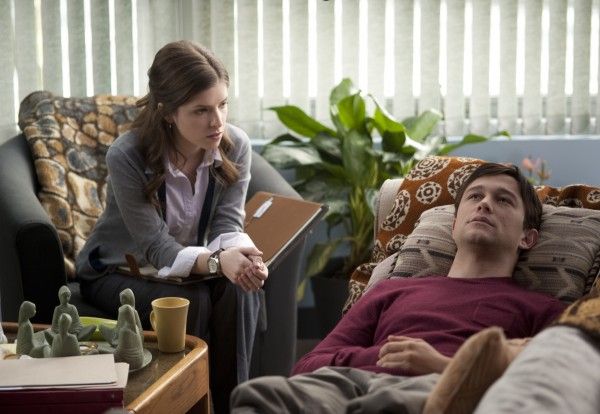 The director’s cut is so much better because it has another 15 minutes added in, and when you’re dealing with subject matter like Watchmen every minute matters. You have the death sequence of the original Night Owl and this really violent scene right after. If you watched it again, the director’s cut, you’d be like that’s just a much better movie.Levine: Really? Yeah. And also, another example is Kingdom of Heaven. The theatrical cut is horrible, it’s like 2 hours and 10 minutes, and you’re like “What the hell movie is this?†And if you watch the director’s cut, it has 40 minutes of additional scenes and it literally is like on the level of Braveheart.Levine: The Ridley Scott movie? Yeah, the Ridley Scott director’s cut of Kingdom of Heaven is one of my favorite films of that year.Levine: Wow. Okay.
The director’s cut is so much better because it has another 15 minutes added in, and when you’re dealing with subject matter like Watchmen every minute matters. You have the death sequence of the original Night Owl and this really violent scene right after. If you watched it again, the director’s cut, you’d be like that’s just a much better movie.Levine: Really? Yeah. And also, another example is Kingdom of Heaven. The theatrical cut is horrible, it’s like 2 hours and 10 minutes, and you’re like “What the hell movie is this?†And if you watch the director’s cut, it has 40 minutes of additional scenes and it literally is like on the level of Braveheart.Levine: The Ridley Scott movie? Yeah, the Ridley Scott director’s cut of Kingdom of Heaven is one of my favorite films of that year.Levine: Wow. Okay. 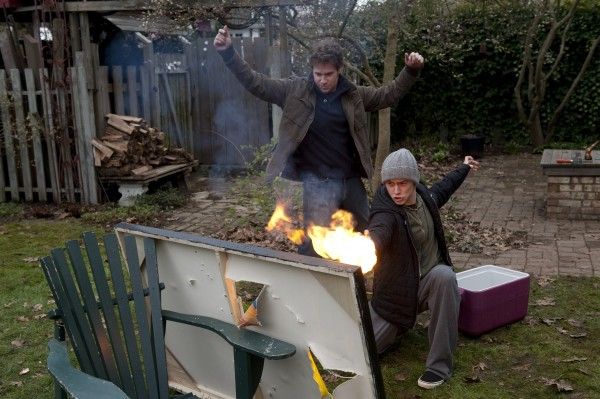 There’s whole characters that, in the theatrical cut, make no sense because their entire back stories have been removed.Levine: Now I gotta see Kingdom of Heaven. It’s a phenomenal film. But let’s get back into your movie. When you were on set filming, were there certain takes where Seth would deliver it more serious, and then certain takes where he would deliver it more comical? Were you playing with the tone on set?Levine: No, we wouldn’t really do that. We would know whether it was gonna be funny or not, before hand. If it was serious, we’d go serious. That’s not to say that every once in a while there weren’t a couple lines, but that’s the thing, I don’t think that you can totally do that, because that kind of changes the entire intention of the scene. We wouldn’t really do it like that, we would do more like ten different funny versions. Or sometimes we would do different dramatic versions, like a few of Joe’s really nice dramatic beats he ad-libbed as well.
There’s whole characters that, in the theatrical cut, make no sense because their entire back stories have been removed.Levine: Now I gotta see Kingdom of Heaven. It’s a phenomenal film. But let’s get back into your movie. When you were on set filming, were there certain takes where Seth would deliver it more serious, and then certain takes where he would deliver it more comical? Were you playing with the tone on set?Levine: No, we wouldn’t really do that. We would know whether it was gonna be funny or not, before hand. If it was serious, we’d go serious. That’s not to say that every once in a while there weren’t a couple lines, but that’s the thing, I don’t think that you can totally do that, because that kind of changes the entire intention of the scene. We wouldn’t really do it like that, we would do more like ten different funny versions. Or sometimes we would do different dramatic versions, like a few of Joe’s really nice dramatic beats he ad-libbed as well. 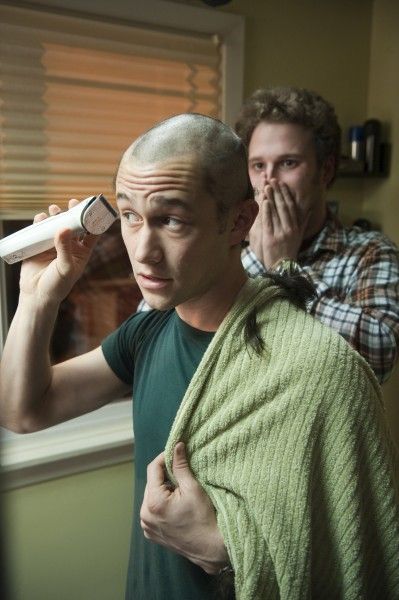 Yeah he’s kind of a talented actor.Levine: Joe? He’s pretty mediocre if you ask me. Eventually he’ll land a big movie.Levine: I find him to be one of the worst actors of his generation. I agree with you, he’s completely overrated, he hasn’t done anything worthwhile. Nothing.Levine: (laughs) To me, he’s literally the best. He’s so incredibly good, I would just sit behind the monitor and marvel. The things he can do, he’s so smart. There’s no doubt that he will be the best actor of his generation for many, many years. And he’s smart in the choices that he makes, he’s just gonna be around forever. He’s so good. I agree, I’m blown away by his work. I think he’s an incredible actor.Levine: I think that he picks good things. He’s not like gonna let himself get played out, he continually tries to challenge himself which I think is really important too. The poster that you guys released constantly reminds you that you guys really filmed the shaving of Gordon-Levitt’s head. Can you talk about filming that scene and getting that right?Levine: Well, we didn’t really have time to—getting it right was like, “Well shit, we better get it right because we only get one shot.†So yeah, he shaved his head at the end of the first day, it was the first scene with him and Seth, and he just did it. We would do a few takes leading up to it, we shot with two cameras, and I think we did one take where he was like, “Okay I’m gonna do it, I’m gonna do it,†and then he was like about to do it and he goes, “No no no, I’m not feeling it,†and then we cut and we did it again. I think everyone was pretty nervous about it because like, you cannot mess it up, if you mess it up it can’t be in the movie. So to me, it was incredibly impressive, and then you see the scene and you see the interplay between him and Seth, and to think that that’s their first scene together and that he had very little prep, and they just click right away. It was just really, really inspiring to see, really fun to watch.
Yeah he’s kind of a talented actor.Levine: Joe? He’s pretty mediocre if you ask me. Eventually he’ll land a big movie.Levine: I find him to be one of the worst actors of his generation. I agree with you, he’s completely overrated, he hasn’t done anything worthwhile. Nothing.Levine: (laughs) To me, he’s literally the best. He’s so incredibly good, I would just sit behind the monitor and marvel. The things he can do, he’s so smart. There’s no doubt that he will be the best actor of his generation for many, many years. And he’s smart in the choices that he makes, he’s just gonna be around forever. He’s so good. I agree, I’m blown away by his work. I think he’s an incredible actor.Levine: I think that he picks good things. He’s not like gonna let himself get played out, he continually tries to challenge himself which I think is really important too. The poster that you guys released constantly reminds you that you guys really filmed the shaving of Gordon-Levitt’s head. Can you talk about filming that scene and getting that right?Levine: Well, we didn’t really have time to—getting it right was like, “Well shit, we better get it right because we only get one shot.†So yeah, he shaved his head at the end of the first day, it was the first scene with him and Seth, and he just did it. We would do a few takes leading up to it, we shot with two cameras, and I think we did one take where he was like, “Okay I’m gonna do it, I’m gonna do it,†and then he was like about to do it and he goes, “No no no, I’m not feeling it,†and then we cut and we did it again. I think everyone was pretty nervous about it because like, you cannot mess it up, if you mess it up it can’t be in the movie. So to me, it was incredibly impressive, and then you see the scene and you see the interplay between him and Seth, and to think that that’s their first scene together and that he had very little prep, and they just click right away. It was just really, really inspiring to see, really fun to watch. 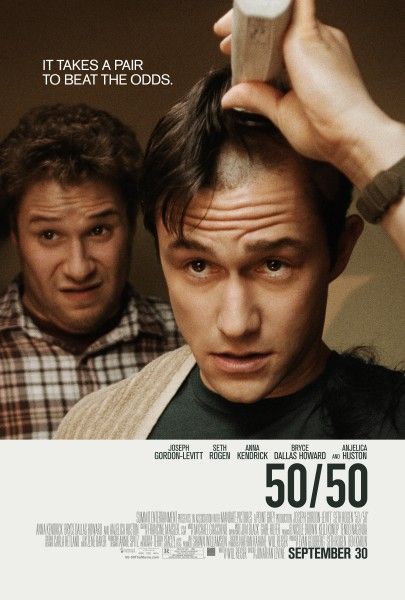 I definitely wanna talk to you about the music in the movie. Can you talk a little bit about getting Pearl Jam in the soundtrack, the choices you made in the soundtrack, and also landing Giacchino?Levine: Well a lot of the music choices, we had Zene [Baker] who edited Observe and Report I think he did a great job with the music in that movie, in our first cut he had a couple great songs that we just were like “We have to have these.†The final piece to come together was that Pearl Jam song, because the ending actually was changed, we had a new ending and I literally tried hundreds and hundreds of different songs. I really wanted an amazing kind of bittersweet moment there, and when you’re trying songs like that, especially when it’s the last song you place in a movie, you don’t have any money because you’ve blown all your money on the Radioheads of the movie and the Bee Gees and all that. But finally I put in Pearl Jam and I showed it to the guys and we were like, “We have to add it.†Not just because it worked so well, but because it’s Pearl Jam and because our movie takes place in Seattle and because I feel like it so beautifully captured the bittersweet moments in the ending. So we went to bat for it and luckily the studio was really supportive and we got it in the movie. As far as Giacchino goes, those guys had been huge fans of his for a very long time. Those guys are slightly more nerdy than me, I mean I like all types of movies, but those guys were like real Lost guys. I knew Up and I knew some of his amazing work, but I wasn’t as much of a fanboy of his as those guys were. Then I met him, and you can’t meet the guy without really just being so inspired by him. I saw Let Me In, I saw what he did there and I was just so very excited and it was such a coup, I think it was because of his relationship with Seth and Evan that he ended up doing the movie. We got him a screener and he watched it and he responded to it. I just think he is so, so good at what he does, and it’s such a coup to get him in the movie. He’s so great at making you feel something without you knowing that he’s making you feel something. He’s my favorite composer working right now.Levine: He is the best. I don’t know if you’ve ever had the opportunity to meet him, but he is an incredibly down to earth and just fun person who cares deeply about what he does, and his spirit is also incredible so it really was a wonderful opportunity to work with him, and hopefully he had a good time because I’m gonna be asking him to do every other movie I make. I’ve interviewed him a few times and yeah he’s super nice. We bond over our mutual love of Speed Racer, because he did the score for that.Levine: Speed Racer, yeah yeah. You go to his house, man, and there’s a storm trooper right when you come in the door. Like a life-size storm trooper. I think I got him a Chewbacca cookie jar as a wrap gift, like an old-school 1977 20th Century Fox Chewbacca cookie jar.
I definitely wanna talk to you about the music in the movie. Can you talk a little bit about getting Pearl Jam in the soundtrack, the choices you made in the soundtrack, and also landing Giacchino?Levine: Well a lot of the music choices, we had Zene [Baker] who edited Observe and Report I think he did a great job with the music in that movie, in our first cut he had a couple great songs that we just were like “We have to have these.†The final piece to come together was that Pearl Jam song, because the ending actually was changed, we had a new ending and I literally tried hundreds and hundreds of different songs. I really wanted an amazing kind of bittersweet moment there, and when you’re trying songs like that, especially when it’s the last song you place in a movie, you don’t have any money because you’ve blown all your money on the Radioheads of the movie and the Bee Gees and all that. But finally I put in Pearl Jam and I showed it to the guys and we were like, “We have to add it.†Not just because it worked so well, but because it’s Pearl Jam and because our movie takes place in Seattle and because I feel like it so beautifully captured the bittersweet moments in the ending. So we went to bat for it and luckily the studio was really supportive and we got it in the movie. As far as Giacchino goes, those guys had been huge fans of his for a very long time. Those guys are slightly more nerdy than me, I mean I like all types of movies, but those guys were like real Lost guys. I knew Up and I knew some of his amazing work, but I wasn’t as much of a fanboy of his as those guys were. Then I met him, and you can’t meet the guy without really just being so inspired by him. I saw Let Me In, I saw what he did there and I was just so very excited and it was such a coup, I think it was because of his relationship with Seth and Evan that he ended up doing the movie. We got him a screener and he watched it and he responded to it. I just think he is so, so good at what he does, and it’s such a coup to get him in the movie. He’s so great at making you feel something without you knowing that he’s making you feel something. He’s my favorite composer working right now.Levine: He is the best. I don’t know if you’ve ever had the opportunity to meet him, but he is an incredibly down to earth and just fun person who cares deeply about what he does, and his spirit is also incredible so it really was a wonderful opportunity to work with him, and hopefully he had a good time because I’m gonna be asking him to do every other movie I make. I’ve interviewed him a few times and yeah he’s super nice. We bond over our mutual love of Speed Racer, because he did the score for that.Levine: Speed Racer, yeah yeah. You go to his house, man, and there’s a storm trooper right when you come in the door. Like a life-size storm trooper. I think I got him a Chewbacca cookie jar as a wrap gift, like an old-school 1977 20th Century Fox Chewbacca cookie jar.

